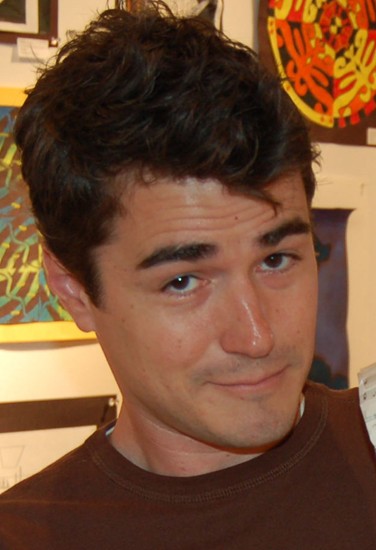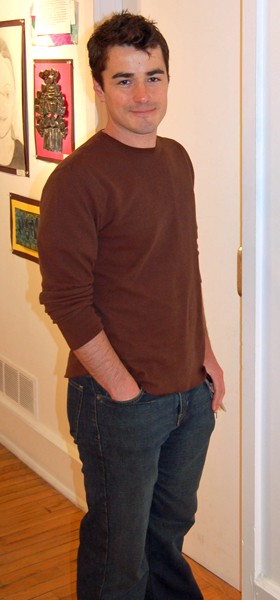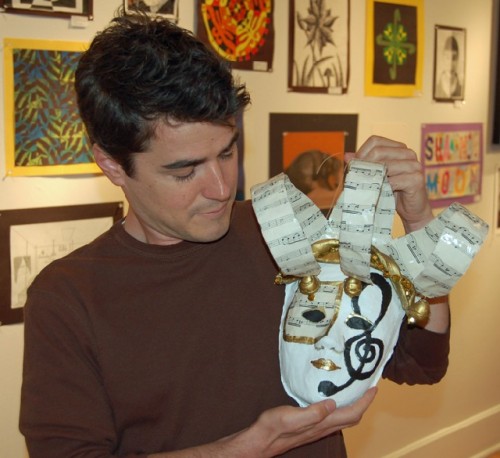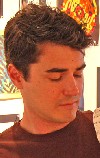The Vince Gatton Interview
Last in Series: I Am My Own Wife at Barrington Stage
By: Larry Murray - Jun 10, 2008
Talking to actors about how they prepare for their roles is endlessly fascinating. That's because each actor approaches the task differently and no two ever use the exact same methods. Stanislavski's "An Actor Prepares" is the root text, but from there the tree of interpretation has many branches.In this interview with Vince Gatton, who played Charlotte and 35 other characters in the recent production of "I Am My Own Wife" at Barrington Stage Company, I found his depth of knowledge about Charlotte, the main character in the play, simply awesome. He had studied her life, her times, and her character down to her bobbles and tics.
At Barrington Stage he played almost as many roles in the one man show, "Fully Committed", also directed by Andrew Volkoff.
Now 38, the actor seems to seek out those parts that are difficult to do, rather than the easier, more traditional roles. When asked what his dream roles were, the role of Lear was mentioned, but then, with mounting enthusiasm, he talked about the difficult and controversial role of "The Pillowman" a very dark 2003 play by Martin McDonagh, and even more surprising, that of Papageno, the chicken catcher, in Mozart's The Magic Flute as originally envisioned by its creator, Emanuel Schikaneder.
T H E I N T E R V I E W
LM: The last night of a run is often the time for inside jokes. Have anything in mind for your final performance of I Am My Own Wife?
VG: There is one thing I thought about doing, yes. My stage manager happens to have a German name, Kielhofer so there is one place I was going to change the name of the doctor in the Stasi prison - he doesn't appear in the play. Alfred refers to Herr Docktor, and I would like to throw in that it was Herr Kielhofer. Ja ja. That's about the extent of how daring I want to play around.
LM: When you prepared for the role of Charlotte, How much time did you have?
VG: We rehearsed for three weeks, which is about what we had for "Fully Committed" as well. The huge strategic difference is that I was cast for "Fully Committed" four days before rehearsals began. I didn't have much time at all so there was hard core memorizing, choice making, under a very intense pressure cooker.
I knew I was going to be doing I Am My Own Wife for three months before we started rehearsals, so a lot of what I did was biographical and historical research. World War II fascinates me and I have done a lot of reading on the subject of Nazi Germany and the Third Reich. On the other hand I knew very little about Germany during the Cold War. It is a much more murky period even though the Nazis and the Stasi were twin institutional threats. The Nazis I got, the Stasi were much more of a blank slate. It was hard to grasp what life was like in East Berlin at the time.
But the biggest thing that I did for the role was to read the script over and over because that kind of familiarity made it possible to do more than just memorize the lines, and more energy could be expended on character work. Memorization alone can take a lot of the time you have to rehearse for a role, but reading it hundreds of times over those three months helped me do what I call "getting my brain sticky" so I wasn't in need of much time to memorize when we finally got into rehearsal. It sort of memorized itself.
I am lucky that I tend to memorize rather easily, because both these shows push your limits on that.
LM: And there's nobody on stage with you to give you a cue if you drop a line.
VG: You are up there on your own. Interestingly it was much more of a threat in "Fully Committed" where pace was a big issue, where to establish the comic rhythms of it your pauses and your breaths for air were few and far between. Wife unspools at a more relaxed pace, there is more room for pregnant silence. I am very lucky in that I don't have to pause to think of what is next, it is very linear.
There are things I did for this that are actually just memorization tricks. Three months prior to beginning rehearsals I transcribed the whole script onto legal pads - I remembered from eighth grade when I had not done my homework and was preparing for a test, I wrote out a cheat sheet. But in doing that I discovered I didn't need it, by writing it out I had memorized it.
LM: Read it, write it, say it.
VG: Right. So I applied it to Wife. It isn't a conscious memorization act so it doesn't mess with your head too much. Looking at, storing it briefly in your short term memory while you turn to your left and write it on a piece of paper it forces you to slow down and pay attention to every single word, rather than glossing over them.
LM: Do you speak German normally?
VG: No. but the director does, so I had a pronunciation coach, and a couple of friends are German speaking so they became the models for some of the characters.
LM: What about the accent itself, it was the subject of a whole article in Berkshire Fine Arts.
VG: Good grief. When I saw Astrid's article I was like, "Oh, wow." I didn't know the kind of scrutiny...
LM: Some actors might say cruel and unusual scrutiny...
VG: I had not realized that I had put Charlotte in a specific geographic location. The one specific Berliner thing that she does - which the real Charlotte did - was the specific pronunciation of the "h" sound (he demonstrates the different pronunciations) which she did. Charlotte von Mahlsdorf had a very, very distinctive way of speaking.
LM: You saw her in the Rosa von Praunheim movie of her life?
VG: Yes, her rhythms are fascinating. The psychiatrist who pronounces her autistic at the end of the play, he doesn't seem so far fetched when you actually hear her cadences, because they are so specific, and they are even more pronounced when speaking english, which was not her native tongue. They become more sing-songy but obviously I do not believe she actually was autistic...
LM: Nor do I...
VG: ...but when you see her, her speech was so patterned, so rhythmic, she had the specific mannerisms, like the formation of her mouth, the tilt of the head back and the eyes up, and the sort of rocking that her head did at times...I can see where the doctor got the idea - the wrong idea - but what he saw, he might think that. So for me it was more about finding a way to catch the flavor of the rhythm of her speech. One that wouldn't become a drone or too sing-songy if it went on for two straight hours. That plus doing a passable German accent. And getting busted for doing a regionalism was not the intention.
LM: I wonder if the psychiatrist who made Charlotte's diagnosis saw many transvestites. Or was familiar enough to know how they very often create roles as part of their preferred personas. Like many drag queens I have known, do you think that Charlotte may have simply created a role for herself and then lived it?
VG: That's an interesting thing. He is diagnosing her based on the stories she told. Tales that she has repeated hundreds of times. What is interesting in the films of her, you can tell when she is doing that. Perhaps it's because I am more attuned to that, relating to her as an actor. You can see that those mannerisms are much more prevalent in those stories. Late in the film, she and Sylvia, one of the two women she is living with, tell the story of the night the Nazi skinheads attacked them, and it clearly is not yet a story that she has rehearsed, or told a hundred times. And there is someone else telling the story with her, so her manner of telling the story is entirely different. All of those bobble tics or siege patterns you get in her stories about her father, or Tante Luise aren't present when she and Sylvia are sitting together going, "Yes, wasn't that awful?"
As she is sharing that unpleasant experience, it is not a rehearsed story. Those sort of things which I know were unconscious on her part indicate that she was often performing a rehearsed story. This is very different from when she is talking conversationally.
After all, she is not consciously a performer, and that is what makes her so delicious. It isn't like a drag performance. But in her own twinkly, not glamorous way she loves the performing. She loves her guided tours and recounting her tales to a reporter, or Doug Wright (the playwright) or the filmmaker. She enjoys her performance but is very different from a RuPaul, you know what I mean?
LM: Exactly. She is drawn in simple charcoal, not in a bright cartoonish way. By the way, I saw this wonderful mask over at the Lichtenstein Center for the Arts called "The Entertainer". It made me wonder if Charlotte always had a mask on.
VG: I don't know if you have studied masks, it is pretty esoteric acting theory I studied in college, and we spent a whole semester on "The Neutral Mask". We sculpted these abstracted faces and then related to them. Very drama school. Fascinating, because they became emotionally and psychologically interesting.
For me doing plays like "I Am My Own Wife" and "Fully Committed", where you need to create a lot of characters without a lot of time to do it, I realized that a lot of things I do to make them come to life is, unconsciously, based on the heady, practical stuff I learned in that mask class 15-20 years ago.
The mask class teaches you all the different ways there are for expression besides this (pointing at his face). In the process I learned a whole vocabulary of things that you are unaware of, and what they mean, what they convey. So it has been fascinating for me to see how these traditional techniques can apply to present day roles.
LM: Would you like to do this play again elsewhere?
VG: I would love to do it again. It is hard for something that you have put so much hard work into - and requires so much of you, rewarding as it is - to do it so briefly. It would be a tough thing to do somewhere else, especially with a different director. It's a question that came up a lot with Fully Committed too, because when you have a show like this in your head, people think you can take it anywhere. The reality is that a theatre that chooses to do it usually has an actor in mind, or there is a director that wants to do it, and they want to cast it and realize their idea of it.
LM: But sometimes, like when you did Candy Darling in "Candy and Dorothy" you can take it to a theatre that understands these things, as you did at the Wellfleet Actors Theatre.
VG; And you bet I would jump at an opportunity like that. I loved working on this because there is a rapport you build with a director and it is hard to overstate how much of this is Andy's doing.
LM: It is clear that you and Andrew Volkoff the director were a matched pair.
VG: Of course I would love to do either of these two shows again. But it is the kind of thing where it would have to be the two of us, the actor and the director. We created this together.
LM: It is a fully developed work at this point. I am curious how audiences beyond the Berkshires would respond. Berkshire audiences are very different from Manhattan audiences. I suspect there is a lot they don't get.
VG: Interesting. There were things that cracked us up in rehearsal that can be more difficult for a general audience. For some of our audiences, the gayer material was challenging, not because they were hostile to it, but because it is so far outside of their experience. For example, in the play Alfred talks about his cock ring, and five or ten members of the audience think it is hilarious, while others are trying to figure out just what a cock ring is.
It is a similar thing when she goes touring the gay spots of West Berlin, you know a lot of the verbiage in that is just foreign to audiences outside the big city. The mention of a glow stick in the middle of that means nothing to them, but others who have done the club scene understand the reference.
LM: Still, you don't have to be Jewish to enjoy Yiddish theater. You have had a couple of acting phases it seems, the first being your "shirtless" period, and this one being the gender bending one.
VG: Ha. My former everything-less period, Yeah, it's been interesting because in my early twenties I did Party for three years in three cities. It becomes part of your life, and certainly the highest profile thing that I have done. After a while it becomes like a special skill on your resume, and an assumption that people would make about you - that you would do it - but after a while it is the quality of the role that is important. So I kind of shifted out of that and in the last few years I worked with a Shakespeare company that did a lot of gender reversing, in Henry IV I was Lady Percy and I loved it, that's a great role! They didn't do anything with costumes, I wasn't in drag, you had to do it just with what you had.
So when "Candy and Dorothy" came along at Theater Three, I auditioned and I was terrible, I didn't know who Candy Darling was. So I played her like some drugged out smack addict. The director said: "Less Sex Pistol, more Kim Novak, please" so though I really bombed it at first, I got the role. I had been wondering why they didn't get a drag queen to play the part, but after reading the script it became clear. It was an actor's part. The part was an absolute joy to play and audiences just loved her character in the play.
LM: Clearly, it struck a note with audiences as you received the Drama Desk nomination for best actor for that role.
VG: That came as a surprise, the show had already finished its run.
LM: You have certainly taken an unusual career path, taken lots of risks, and delighted all of us here in the Berkshires with your portrayal of Charlotte in "I Am My Own Wife". We look forward to your return in the near future.
VG: So do I.
With thanks to Julianne Boyd, artistic director of Barrington Stage Company for taking a chance on "I Am My Own Wife".
And to Megan Whilden and the Lictenstein Center for the Arts, 28 Renne Avenue, Pittsfield which hosts a constantly changing series of art exhibits for allowing us to take pictures.




